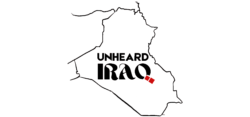
Listen to
Our Stories
This podcast centers on their stories. It elevates their voices.
From schools to shops and streets, the people of Mosul can fill volumes with tales of who they are and what they’ve witnessed.
In this series, we turn the volume up and bring Mosul to America.
Risam And The Lost Art of Mosul (Art)
Novice reporter Aya speaks with Risam, a 22-year-old artist from Mosul in his art studio, on the street, and in the markets about how he learned to draw from his father. He speaks of growing up in a city once known for its arts and unique aesthetics which has abandoned its value for art as the struggle to survive conflict and occupation takes precedence. Risam speaks of the violence of the ISIS occupation, their outlawing of the arts, and the brutally destructive campaign against ISIS by Coalition forces, which destroyed much of the city’s art that he once admired. Finally, Risam tells of his recent gallery expos in Turkey, and his attempts to inform the outside world about Mosul’s suffering through his art, and he questions whether the Old Mosul—creative, beautiful, and cosmopolitan—can ever be recovered.
Zafart And Mosul’s Cosmopolitan Past (Culture)
Zafart, a Christian Mosuli of Armenian origin, was forced to flee Mosul during the ISIS occupation, to Iraqi Kurdistan. She speaks with reporter Esraa Al Rawi from Kurdistan about growing up in Mosul with Sunni, Shia, Christian, and Yazidi neighbors, and of a Mosul that used to bring immigrants and students from around the world. She speaks of her family life growing up, and the waves of crisis that befell Iraq: war with Iran, sanctions, US invasion, and ISIS occupation. Zafart speaks of the importance of her faith and her desire to return to Mosul.
Noor The Warrior Poet (Women)
In this episode, Mohammed Namiq, now a reporter with Mosul’s Radio Al Ghad, speaks with the quiet but powerful Noor, a 19-year-old poet and radio presenter. Noor talks about growing up in Mosul where she only knew instability and conflict. She tells Mohammed about how she slowly went blind due to a medical condition during the course of the ISIS occupation, but how she has persisted in her pursuits of poetry, and become a local radio host. Through her struggle, Noor has become an inspiration to other young women in Mosul.
The Baker Brothers (Economy)
Reporter Layth Akram speaks to brothers Mohammed and Ayad, two men who have been running a bakery in Mosul for decades, making traditional Mosuli bread. The brother recounts growing up in Mosul during the seventies and eighties, and the shifting economy and social mores. Through their story, we learn about Mosul’s distinct food culture, and the political economy of things as simple as flour and bread, as the brothers relate the impact of sanctions, war, and occupation through food: flour—when there was a shortage and when food was abundant.
The Changing Role of Education (Education)
Dr. Thaer, a professor of education at the once-prestigious University of Mosul, discusses the changes he’s seen in the education system in Iraq. Where Iraq used to attract students from the region and well beyond, its crumbling infrastructure after years of wars, sanctions, and occupations has made it one of the worst educational systems in the region. Dr. Thaer’s account of the changes in education that he’s witnessed give us a window into the changing Iraqi society and culture, turning inward and becoming more conservative as international circumstances pushed Iraqis to cling to tradition for stability. Questions arise as to whether Mosul can regain its rich intellectual heritage.
This podcast revolves around these people. It is long overdue.
